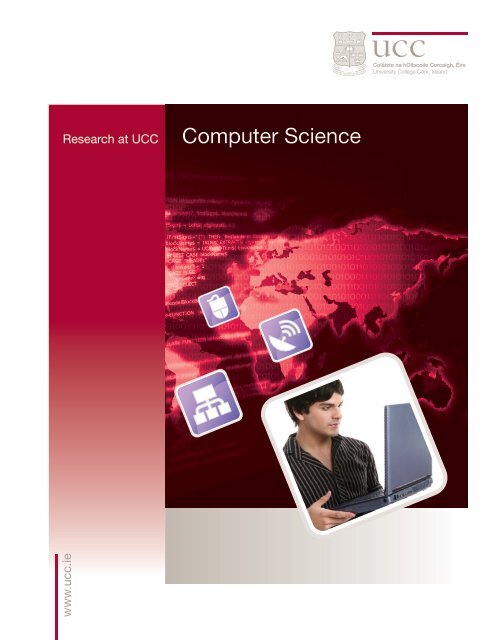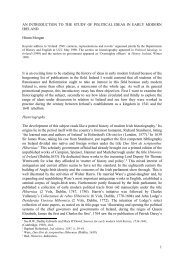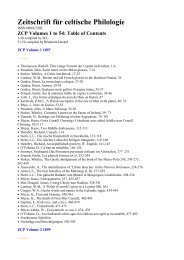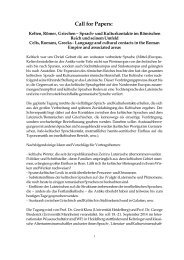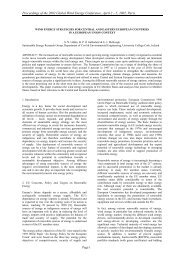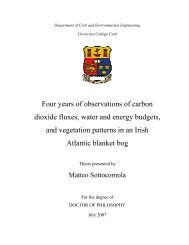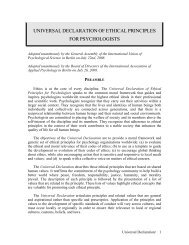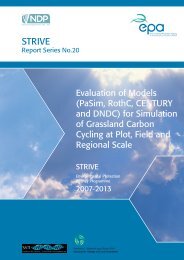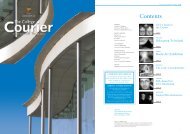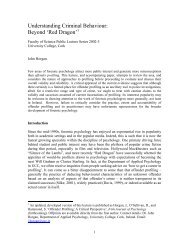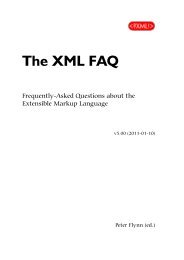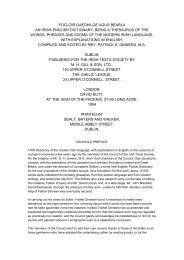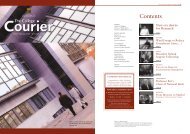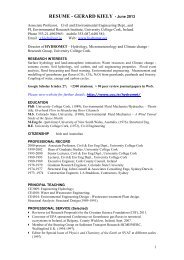Computer Science - University College Cork
Computer Science - University College Cork
Computer Science - University College Cork
You also want an ePaper? Increase the reach of your titles
YUMPU automatically turns print PDFs into web optimized ePapers that Google loves.
Research at UCC<br />
<strong>Computer</strong> <strong>Science</strong><br />
www.ucc.ie
Overview<br />
<strong>Computer</strong> <strong>Science</strong> is a modern scientific discipline that impacts almost every aspect<br />
of human activity, ranging from commerce and government, to entertainment, medicine<br />
and telecommunications. In contrast to conventional scientific disciplines, <strong>Computer</strong><br />
<strong>Science</strong> combines elements drawn from science, engineering and business. Research<br />
in <strong>Computer</strong> <strong>Science</strong> is driven by a vibrant and growing IT industry and is the key<br />
contributor towards building the national vision of a ‘knowledge economy’.<br />
<strong>Computer</strong> <strong>Science</strong> at UCC is an exciting and dynamic department and a major<br />
contributor to UCC’s success in terms of attracting research funding, partnerships with<br />
industry, and achieving a high international profile. It builds on a proud and historic<br />
tradition – back in the 19th century at UCC, George Boole developed the mathematical<br />
(Boolean) logic which is the basis for all digital computer design today.<br />
Today at UCC the Department of <strong>Computer</strong> <strong>Science</strong> comprises nearly 30 full-time<br />
academic staff, an equivalent number of post-doctoral researchers and approximately<br />
80 post-graduate research students. Academic staff members have doctorate degrees<br />
from many of the world’s top universities, including Cambridge <strong>University</strong>, Carnegie<br />
Mellon <strong>University</strong>, Cornell <strong>University</strong> and Oxford <strong>University</strong>. In terms of key indicators<br />
- over the past five years, the Department has secured approximately €30 Million in<br />
external research funding, and produced over 550 peer-reviewed published scientific<br />
papers. In addition to major government grants, current research projects are funded<br />
by nearly a dozen companies, including indigenous Irish companies as well as large<br />
multinationals. As evidence of the broad impact of <strong>Computer</strong> <strong>Science</strong>, staff in the<br />
Department enjoy active collaborations with their peers in other disciplines at UCC,<br />
including Engineering, History, Medicine and Mathematics. Further afield, many collaborative<br />
projects involve fellow computer scientists working at many of the world’s top<br />
universities and research laboratories.<br />
<strong>Computer</strong> <strong>Science</strong> at UCC has played a pivotal role in the economic development of<br />
the region by supplying graduates, stimulating inward direct investment and supporting<br />
indigenous companies. It also has a key role within UCC, as formally recognised by its<br />
inclusion in the <strong>University</strong>’s strategic plan. UCC recently demonstrated its commitment<br />
to <strong>Computer</strong> <strong>Science</strong> and the IT industry by initiating construction of a major new IT<br />
Building to provide high quality teaching, research and commercialisation facilities to<br />
support the future growth and development of the Department.<br />
Research Activity<br />
<strong>Computer</strong> <strong>Science</strong> has an active research programme in a range of areas. Research is<br />
mainly funded through <strong>Science</strong> Foundation Ireland (SFI), Enterprise Ireland, Higher<br />
Education Authority (HEA), the European Union and industrial sponsorship for work on<br />
projects with collaborators spread throughout Europe and North America. The key<br />
research areas of the <strong>Computer</strong> <strong>Science</strong> Department focus around six major themes:<br />
• Artificial Intelligence, Constraint Programming and Case-Based Reasoning<br />
• Multimedia<br />
• <strong>Computer</strong> Security<br />
• Distributed Computing<br />
• Networking and Embedded Systems<br />
• Foundations of Computing and Formal Verification
Research Centres<br />
The majority of research within the Department of <strong>Computer</strong> <strong>Science</strong> takes place in its key research laboratories:<br />
Boole Centre for Research in<br />
Informatics (BCRI)<br />
Directors: Professor John Morrison,<br />
Professor Pat Fitzpatrick<br />
http://www.bcri.ucc.ie/<br />
The Boole Centre for Research in Informatics brings together<br />
the expertise of the Department of <strong>Computer</strong> <strong>Science</strong> and the<br />
School of Applied Mathematics, Mathematics and Statistics in<br />
unique inter-disciplinary initiative. The research of the Centre<br />
is currently in three broad themes namely, Information Theory,<br />
the Theory of Computation, and Computing Paradigms.<br />
The centre was established with a grant of €5.2 Million that<br />
was secured from the Irish Higher Education Authority as the<br />
result of a highly competitive peer-reviewed selection<br />
process. Since its inception members of the BRCI have also<br />
secured major grants from <strong>Science</strong> Foundation Ireland and<br />
other sources. The BCRI has a 100-node cluster, manufactured<br />
at Dell’s European Manufacturing Facility in Limerick.<br />
This machine is used to support a range of projects both<br />
internally and also externally through participation in national<br />
Grid computing networks.<br />
Centre for Efficiency-Oriented<br />
Languages (CEOL)<br />
Director: Professor Michel Schellekens<br />
http://www.ceol.ucc.ie<br />
CEOL was established with initial funding from <strong>Science</strong><br />
Foundation Ireland in the form of an Investigatorship Award<br />
to its director, Professor Michel Schellekens, and is also<br />
supported by Sun, Xilinx and Synopsis. The centre forms<br />
part of Ireland’s determined large scale investment in ICT<br />
and aims to contribute to the ICT ‘music’* of the future.<br />
Real-Time software can guarantee that deadlines are met in<br />
safety critical situations and is widely applied in telephone<br />
exchanges, satellite communications, medical equipment,<br />
chemical-plant control, stock-market analysis and robotics.<br />
CEOL’s mission is to improve software timing at source code<br />
level. CEOL focuses in particular on modular static derivation<br />
of running time and on related investigations in memory use<br />
and energy use.<br />
*CEOL, pronounced ‘kyohl’ is the Irish Gaelic word for music.
Centre for Unified Computing<br />
(CUC)<br />
Director: Professor John Morrison<br />
http://www.cuc.ucc.ie<br />
Research at The Centre for Unified Computing is focused<br />
primarily on the fields of High Performance and Distributed<br />
Computing, with related work being performed in numerous<br />
areas such as Peer-to-Peer Computing, Autonomics, Security,<br />
Reconfigurable Computing and Economic Models. It is<br />
perhaps best known for WebCom, a fully-featured distributed<br />
computing environment and workflow enactment system that<br />
has been the focus of many years of research. Much of its<br />
work, including WebCom, stems from the Condensed Graphs<br />
model of computing developed by the group’s founder,<br />
Professor John Morrison. This model is unique in that it allows<br />
three different evaluation strategies (availability-driven,<br />
coercion-driven and control-driven) to be incorporated within<br />
the same computation. The group has been in existence for<br />
almost a decade. Over this period it has attracted significant<br />
amounts of funding from <strong>Science</strong> Foundation Ireland and<br />
Enterprise Ireland, written a large number of published papers,<br />
hosted several events and participated in a number of collaborations<br />
with outside researchers.<br />
Mobile & Internet Systems<br />
Laboratory (MISL)<br />
Director: Professor Cormac J. Sreenan<br />
http://www.cs.ucc.ie/misl/<br />
The Mobile & Internet Systems Laboratory (MISL) was founded<br />
in 2000 after Professor Sreenan joined UCC from AT&T (Bell)<br />
Labs Research in the USA. The Laboratory conducts research<br />
in the area of computer networking, with a focus on mobile/<br />
wireless networks and multimedia systems. In these areas the<br />
members of the laboratory are active in terms of publications,<br />
patents, and professional activities such as journals and<br />
conference committees. Recent work has focused primarily<br />
on wireless sensor networks – an area in which MISL has<br />
established a very high profile internationally. Other ongoing<br />
projects include content distribution in IPTV networks,<br />
handover in next-generation mobile networks, and routing in<br />
wireless mesh networks. The laboratory currently hosts over<br />
10 research staff and students. Recent sponsors include AT&T,<br />
Australian Research Council, Enterprise Ireland, EU, FEXCO,<br />
Irish Research Council, Microsoft Research, and <strong>Science</strong><br />
Foundation Ireland.<br />
<strong>Cork</strong> Constraint Computation<br />
Centre (4C)<br />
Director: Professor Eugene Freuder<br />
http://www.4c.ucc.ie<br />
The mission of the <strong>Cork</strong> Constraint Computation Centre (4C) is<br />
to help computers to help individuals and businesses make<br />
better decisions. Constraints arise in design and configuration,<br />
planning and scheduling, diagnosis and testing, and many<br />
other contexts; constraint computation can solve problems in<br />
manufacturing, telecommunications, supply chain optimisation,<br />
network management, internet commerce, electronics,<br />
bioinformatics, transportation, and many other fields. 4C<br />
members have won national and international recognition for<br />
their work. For example, two 4C students were shortlisted for<br />
the 2006 Irish Software Association Student Medal for<br />
Commercially Viable Software, and the Director of 4C was<br />
elected a Fellow of the American Association for the<br />
Advancement of <strong>Science</strong> in 2005 and a Member of the Royal<br />
Irish Academy in 2007. 4C has been awarded approximately<br />
20M euro in funding. Its core funding has come from <strong>Science</strong><br />
Foundation Ireland; it also has received funding from the<br />
European Union, Enterprise Ireland, the Embark Initiative, the<br />
Health Services Executive, and from industry. 4C has worked<br />
with local Irish industry and with multinationals like Lucent,<br />
Xerox, Bausch & Lomb, British Telecom and Microsoft.<br />
Contacts<br />
Professor Gregory M. Provan<br />
Head of Department<br />
Department of <strong>Computer</strong> <strong>Science</strong><br />
<strong>College</strong> of <strong>Science</strong>, Engineering & Food <strong>Science</strong><br />
Kane Building<br />
<strong>University</strong> <strong>College</strong> <strong>Cork</strong><br />
Ireland<br />
Tel: +353 21 4902795<br />
Fax: +353 21 4274390<br />
Email: secretary@cs.ucc.ie<br />
Web: www.cs.ucc.ie


